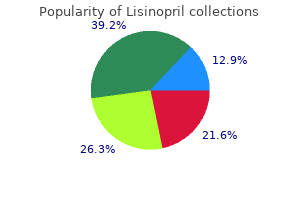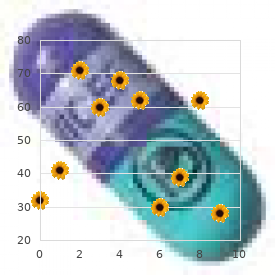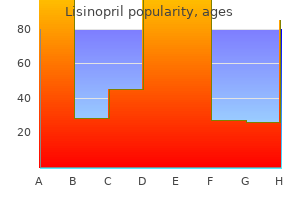Harry C Dietz, III, M.D.
 https://www.hopkinsmedicine.org/profiles/results/directory/profile/0002765/harry-dietz Efforts should be made to ensure vaccine administration during the hospitalization or at discharge blood pressure jumps around order lisinopril with a mastercard. Children adopted from countries that are not part of the Hague Convention can receive waivers to have their immunizations delayed until arrival in the United States ( However blood pressure zoladex buy lisinopril without prescription, selected refugees bound for the United States are immunized in their country of origin before arrival in the United States blood pressure 8550 buy generic lisinopril line. Refugee children 4 purchase lisinopril 10 mg amex, however, almost universally are immunized incompletely and often have no immunization records. Increasingly, more of these vaccines are being incorporated into the immunization schedules in countries outside the United States. Evaluation of concentrations of antibody to vaccine-preventable diseases some times is useful to ensure that vaccines were given and were immunogenic, as well as to docu ment immunity from past infection (see Serologic Testing to Document Immunization Status). A combined strategy of serologic testing for antibodies for some vaccine antigens and immunization for others may be used. The cost of testing versus the cost of administering a given immunization series, as well as the likelihood of adherence for com pleting the immunization series, also should be considered in these decisions. In most situ ations, a record verifying the administration of a complete vaccine series would be more reliable than serologic testing. If a child does not have protective antibodies, the series should be restarted, with the understanding that for some vaccine-preventable diseases, fewer doses of vaccine are needed to complete the series as a child ages. The immunization record, plus pres ence of antibody to diphtheria and tetanus toxoids, can be used as proxy for receipt of pertussis-containing vaccine dose(s). In children older than 12 months, hepatitis A, measles, mumps, rubella, and varicella antibody concentrations could be measured to determine whether the child is immune; these antibody tests should not be performed in children younger than 12 months because of the potential presence of maternal antibody. The documented receipt of 2 doses of varicella vaccine is the best indication of immunity to varicella, because commercially available varicella anti body tests are insensitive. Neutralizing antibody tests for poliovirus are not available gen erally, and only presence of antibody to all 3 serotypes would preclude need for poliovirus vaccine. Age-appropriate pneumococcal vaccine dose(s) should be administered if a completed series is not documented; serologic testing should not be performed for validation or evidence of immunity. Routinely rec ommended immunizations should be up-to-date before international travel; some rou tinely recommended immunizations should be given early or on an accelerated schedule. Travelers to tropical and subtropical areas often risk exposure to malaria, dengue, diarrhea, and skin diseases for which vaccines are not available. For travelers to areas with endemic malaria, antimalarial chemoprophylaxis and insect precautions are vitally impor tant (see Malaria, p 528). Local and state health departments and travel clinics also can provide updated information. Infants and children embarking on international travel should be up-to-date on receipt of immunizations recommended for their age. To optimize immunity before departure, vac cines may need to be given on an accelerated schedule. These include all areas of the world except Australia, Canada, Japan, New Zealand, and Western Europe. Inactivated HepA is used for immu noprophylaxis for people 1 year of age and older. A combination HepA-HepB vaccine is available for people 18 years of age and older. Hepatitis B vaccine (HepB) is recommended routinely for all children in the United States and should be considered for susceptible travelers of all ages (ie, those born before universal recommendations) visiting areas where hepatitis B infection is endemic, such as countries in Asia, Africa, and some parts of South America (see Hepatitis B, p 400). If the accelerated schedule is used, a fourth dose should be given at least 6 months after the third dose (see Hepatitis B, p 400). People traveling abroad should be immune to measles to provide personal protection and minimize importation of the infection. Importation of measles remains 2 an important source for measles cases in the United States. People should be considered susceptible to measles unless they have documentation of appropriate immunization, physician-diagnosed measles, laboratory evidence of immunity to measles, or were born in the United States before 1957. Before their departure from the United States, children 12 months and 1Centers for Disease Control and Prevention. Polio remains endemic in a few countries in Africa and Asia (an up-to date listing of polio cases can be found at To ensure protection, all children should be immunized fully 2 against poliovirus. In the tropics, transmission varies with monsoon rains and irrigation practices, and cases may occur year-round. Short-term travelers should be encouraged to avoid high-risk areas or not to take their children to these high-risk areas. The last is not appropriate for people traveling to sub-Saharan Africa or another area where serogroup A or W disease is prevalent. Revaccination with a conjugate vaccine is recommended for people who are at continuous or repeated increased risk of meningococcal infection (see Meningococcal Infections, p 547). Rabies immunization should be considered for children who will be traveling to areas with endemic rabies where they may encounter wild or domestic animals (particu larly dogs). The 3-dose preexposure series is administered by intramuscular injection (see Rabies, p 658). Periodic serum testing for rabies virus neutralizing antibody is not necessary for routine international travelers. When travelers live or work among the general population of a country with a high prevalence of tuberculosis, the risk may be appreciably higher. Children returning to the United States who have signs or symptoms compatible with tuberculosis should be evaluated immediately for tuberculosis disease. Yellow fever occurs year-round, predomi nantly in rural areas of sub-Saharan Africa and South America; in recent years, outbreaks have been reported, including in some urban areas. Although rare, yellow fever continues to be reported among unimmunized travelers and may be fatal. There is increased risk of adverse events in people of any age with thymic dysfunction and people older than 60 years of age. Meningoencephalitis has been reported in neonates (8 days and 38 days old) exposed to vaccine virus through breastfeeding. In addition to vaccine-preventable diseases, travelers to the tropics will be exposed to other diseases, such as malaria, which can be life threatening. Educating families about self-treatment, particularly oral rehydration, is critical. Packets of oral rehydration salts can be obtained before travel and are available in most pharmacies throughout the world, including in developing countries where diarrheal dis eases are most common. The highest-priority agents for preparedness have a moderate to high potential for large-scale dissemination, cause high rates of mortality with potential for major public health effects, could cause public panic and social disruption, and require special action for public health prepared ness. These include organisms such as anthrax, smallpox, plague, tularemia, botulism, and viral hemorrhagic fevers, including Ebola, Marburg, Lassa, Junin, and other related viruses. Moderate risk agents are fairly easy to disseminate, cause moderate morbidity and low mortality rates, but still require enhanced diagnostic capacity and disease sur veillance to respond effectively and mitigate health effects. Some examples of moderate risk agents include Coxiella burnetii (Q fever), Brucella species (brucellosis), Burkholderia mallei (glanders), Burkholderia pseudomallei (melioidosis), alphaviruses (Venezuelan equine, eastern equine, and western equine encephalitis), Rickettsia prowazekii (typhus), and toxins such as ricin toxin from Ricinus communis (castor beans) and Staphylococcus enterotoxin B. Additional organisms that could create foodborne or waterborne safety threats include, but are not limited to , Salmonella species, Shigella dysenteriae, Escherichia coli O157:H7, and Vibrio cholerae. In addition, children depend on others for their health and safety, and those individuals may become ill or require quarantine during a bioter rorism event. Many preventive and therapeutic agents recommended for adults exposed or potentially exposed to agents of bioterrorism have not been studied in infants and chil dren. Public health assessment and prioritization of poten tial biological terrorism agents. Examples include Nipah virus, hantavirus, tickborne hemorrhagic fever viruses, and tickborne encephalitis viruses. Risk assessments for evaluation and prioritization of potential bioterrorism threats are conducted by the Department of Homeland Security. Count One: That on or about the fifteenth day of November blood pressure medication harmful cheap 10mg lisinopril, 1959 blood pressure yoga poses quality 5 mg lisinopril, one Richard Eugene Hickock did unlawfully arrhythmia vs palpitations order lisinopril master card, feloniously blood pressure over 60 lisinopril 2.5 mg low cost, willfully and with deliberation and premeditation, and while being engaged in the perpetration of a felony, kill and take the life of Herbert W. The agents quoted Hickock as saying he and Smith invaded the Clutter home expecting to find a safe containing at least ten thousand dollars. Officers have declined to reveal whether it was Hickock or Smith who actually shot the members of the family. Generally, townspeople in the community of two hundred and seventy expressed relief. Myrtle Clare, said the residents are glad the case has been solved, but some of them still feel others may be involved. She said plenty of folks are still keeping their doors locked and their guns ready. Indeed, a sizable faction refused to accept the fact that two unknown men, two thieving strangers, were solely responsible. Dewey is driving the lead car, Perry Smith sits beside him, and Duntz is sitting in the back seat. He continues to contemplate the scenery, to read Burma-Shave doggerel, and to count the carcasses of shotgunned coyotes festooning ranch fences. Says one time out there in Las Vegas you went after a colored man with a bicycle chain. On the way out there, out to Holcomb, I wanted to stop and buy some black silk stockings to wear over our heads. Somewhere on the outskirts of Emporia, we passed a Catholic hospital, and I persuaded him to stop and go inside and try and buy some black stockings from the nuns. I hardly realized it when we went through Holcomb, it was such a little settlement. It was like broad day, and when we started up the road, Dick said,Look at this spread! But he said it was a damn sight nearer the Clutter house than it was supposed to be. The one window was curtained with Venetian blinds, but moonlight was coming through. It was a paneled wall, and there were books and framed maps, and I noticed, on a shelf, a terrific pair of binoculars. We came to a hall and a door, and Dick, remembering the diagram, said it was a bedroom. Clutter, barefoot, just wearing pajamas, he went with us to the office and we turned on the office lights. When I found the telephone, I removed the receiver and cut the line with a pair of pliers. Clutter said that was all the cash he had, and explained he always did business by check. The idea was to lock the parents in the bathroom, and wake the kids and put them there, then bring them out one by one and tie them up in different parts of the house.
Her vague memories include blood pressure supplements discount lisinopril 5 mg with amex, receiving butt shots and yet having a female-shaped body and breast development during puberty hypertension xanax buy discount lisinopril on line. She reports trying hard to fit in as a male but lived in fear and self-loathing and hiding aspects of myself heart attack with pacemaker purchase 5mg lisinopril with mastercard. During an exam pulse pressure high cheap lisinopril generic, Dana learned that the shots she had been given as a child were actually testosterone. She was diagnosed with a micropenis and a type of hypogonadism called primary testicular failure. Goto reports that at age 17 she learned about her intersexuality when she visited her family doctor to get birth control (though she has no menses). Goto became happily married, and subsequently had an orchidectomy to remove to remaining testicular tissue. The doctor pointed out how the shame she felt was negatively affecting her life and referred her to re sources for meeting other women like her. Lynn Edward Harris reports that he was born in Orange County California in 1950, and was named Lynn Elizabeth Harris. Harris was assigned female by his mother and pediatrician and remained in that gender role until age 29. He was diagnosed at age 23 as possessing a rare, complex, congenital condition known asTrue Hermaphroditism with undescended, sub-sized ovotestes i. Harris petitioned the Superior Court of California to change his birth certificate. Hobbs began to masculinize and began to be harassed in locker rooms by being called girl-boy and being told No one wants to be with a girl that looks like a boy. Hobbs did not discuss the harassment at school due to feelings of hopelessness and humiliation. Hobbs states that no one would discuss what was going on and his troubles were brushed under the rug and that the solution to his suffering was to try to appear as normal as possible. Hobbs was 22, an endocrinologist informed him that his medical records stated that his body is ambiguous and that he could not tell what sex Mr. Hobbs reported that the doctor could not explain much, and he has not learned much from other doctors he has consulted. He states that he has developed self acceptance through peer support and by speaking about his experiences. He expressed the belief that he would have avoided a lot of agony and pain when he was younger if he had only spoken with other people like himself. Hobbs reports having spent years in drug and alcohol dependency trying to deal with his childhood trauma. Long questioned the right for doctors to make such determinations, Unfortunately, no one asks the child what would make him or her happy. Long continued the interventions, despite the illness and the humiliation by the doctors. When my mother overheard me saying that at the age of 15 she whipped me and told me I was an embarrassment to her. He stated that it is the shame of misinformation, unnecessary surgeries, and isolation that does the harm. Mike requested that everyone be compassionate to all those who have come and will come into this world in intersex bodies. The doc tors initially assigned her as male and then reassigned Mani after performing a lapa rotomy. Reassignment was kept secret from Mani, and the local community decided at a meeting to act as if Mani had always been female. Mani expressed that the most emotional damage was inflicted by thoughtless attitudes of others. She reported that constant trips to the doctor were physically painful, intrusive, and humiliating. Mani states that the topic was never discussed in the family so no explanation of being inter sex was ever discussed or disclosed. In an operating room theater, Mani was exposed to observation by strange doctors and subsequently was forced to endure normalizing surgery which left her scarred, in pain, and with dimin ished sexual functioning as an adult. Mani recalls that her legs were tied to the bed and her arms were restrained with a straight jacket. She reports that she suffered horribly because she was insufficiently medicated for pain control. Mani states that the shame and secrecy were the most devastating aspect of the treat ment, and that her body was simply different and not damaged or diseased and there fore did not need fixing. She stated that the secrecy surrounding her treatment added to her sense of anger and rage for being assigned the wrong sex. Robyn stressed that in tersex individuals want most a sense of self-determination. She further stated that she believes that is tantamount to severe abuse that an individual has to undo what was once done in the name of medical science. She wanted most of all to not be treated like oddities, but as feeling human beings with the same rights as anyone regardless of birth circumstance. He stated that after he was born, his father and the doctors spent much time behind closed doors, excluding his mother from the decision-making process. He described becoming aware that he was not the sex that others had told him he was at three years of age. Spencer recalled being forced to wear a pink, frilly dress and he quickly ripped it to pieces on the playground. He reports having a very isolated childhood, where he was regularly teased as being homosexual even though he had no knowledge of sex whatsoever. Spencer developed a solitary style of survival, avoiding people and relationships, preferring the peace and quiet of the wilderness. He joined the scouts where It was easy to pretend things were as they should bebecause the subject of sex was never mentioned Fr. Spencer avoided school, which he saw as a place of punishment and alienation and spent most of his time in nature and away from school. Spencer entered into an even more lonely adulthood, lacking in intimate relationships. Spencer discovered that his caring nature provided healing for others, and after ten years of worry and study, he was finally ordained as a Catholic priest. The celibacy required by the church provided respite from expectations of sexual intimacy. There, no one questioned his masculinity and he was warmly welcomed into an ecu menical monastic community.
Should I continue breastfeeding if I live in an area of West Nile virus transmission Because the health benefits of breastfeeding are well established hypertension recommendations generic lisinopril 2.5mg line, and the risk for West Nile virus transmission through breastfeeding is unknown hypertension x-ray generic 2.5mg lisinopril mastercard, the new findings do not suggest a change in breastfeeding recommendations arteria linguae profunda generic lisinopril 10mg online. Blood Transfusion prehypertension ppt buy discount lisinopril 2.5 mg on line, Organ Donation and Blood Donation Screening Information Questions related to West Nile Virus Infections in Organ Transplant Recipients - New York and Pennsylvania, August-September, 2005. What is the current protocol for testing donors or organs before a transplant is conducted Organ donors are screened to identify infectious risks on the basis of national organ procurement standards. There are several issues to consider: (a) time, (b) type of test and (c) potential biological differences. Clinicians should be aware that transplant-associated infectious disease transmission can occur and should be vigilant for unexpected outcomes in transplant recipients, particularly when they occur in clusters. If I recently had a transfusion or transplant, should I be concerned about getting West Nile virus You should be aware of the potential risk for West Nile virus infection and the need to monitor your health. If you have symptoms of West Nile virus or other concerns you should contact your physician. If a patient who recently received a blood transfusion or organ transplantation develops a West Nile virus infection, that does not necessarily mean that the transfusion/ transplantation was the source of infection. They can be either biological (such as toxin from specific bacteria that is lethal to mosquito larvae but not to other organisms) or chemical products, such as insect growth regulators, surface films, or organophosphates. Larvicides are applied directly to water sources that hold mosquito eggs or larvae. When used well, larvicides can help to reduce the overall mosquito by limiting the number of new mosquitoes that are produced. Adulticides can be applied from hand held sprayers, truck-mounted sprayers or using airplanes. Adulticides, when used well, can have an immediate impact to reduce the number of adult mosquitoes in an area, with the goal of reducing the number of mosquitoes that can bite people and possibly transmit West Nile virus. Chemical control measures are one part of a comprehensive and integrated mosquito management program. An integrated program is the most effective way to prevent and control mosquito-borne disease. An integrated mosquito management program should include several components: (1) surveillance (monitoring levels of mosquito activity, and where virus transmission is occurring), (2) reduction of mosquito breeding sites, (3) community outreach and public education, and (4) the ability to use chemical and biological methods to control both mosquito larvae and adult mosquitoes. Control measures, including the decision to use chemical adulticides (pesticides to kill adult mosquitoes) should be based on surveillance data and the risk of human disease. Effect on human health is one of the primary factors considered in regulation of pesticides. People who are concerned about exposure to a pesticide, such as those with chemical sensitivity or breathing conditions such as asthma can reduce their potential for exposure by staying indoors during the application period (typically nighttime). This study found that "application of certain insecticides poses a low risk for acute, temporary health effects among person in areas that were sprayed and among workers handling and applying insecticides. What should I do if I think that I am having health problems because of pesticides used in my area If you are experiencing health problems for any reason it is important to see your health care provider promptly. If you are experiencing severe health problems go immediately to an Emergency Room. A great deal of research must be done before pesticides can be used in the environment. Each state has mandated training and experience requirements that must be met before an individual can commercially apply pesticides. In New York state, for example, certified pesticide apprentices must be at least 16 years of age, have completed an 8-hour core training course on safety issues and the use of pesticides, and have at least 40 hours of pesticide use experience in the field under the direct supervision of a certified pesticide applicator. In addition, these applicators must follow the instructions and precautions that are printed on the pesticide label. All pesticide products are required to have a label which provides information, including instructions on how to apply the pesticide and precautions to be taken to prevent health and environmental effects. Environmental Protection Agency, as this agency has responsibility for registration of pesticides. Your local mosquito control program or health department can give information about the type of products being used in an area. Mosquito control activities are most often handled at the local level, such as through county or city government. Check with your health department or in the "blue" (government) pages of the phone book for the contacts in your area. Some infected cats exhibited mild, nonspecific symptoms during the first week after infection-for the most part only showing a slight fever and slight lethargy. Treatment would be supportive (managing symptoms, if present) and consistent with standard veterinary practices for animals infected with a viral agent. Does my dog/cat becoming infected pose a risk to the health of my family or other animals There is no documented evidence of dog or cat-to-person transmission of West Nile virus. The evidence suggests that dogs do not develop enough virus in their bloodstream to infect more mosquitoes. Cats develop slightly higher levels of virus in their bloodstream, but it is unclear if this would be enough to infect mosquitoes. It is very unlikely that cats would be important in furthering the spread of the virus. You should take measures to prevent mosquitoes from biting you (use repellent and wear protective clothing. There is also evidence that cats can become infected with the virus after eating experimentally infected mice. Preliminary studies have not been able to detect virus in the saliva of infected dogs. There is no reason to destroy an animal just because it has been infected with West Nile virus. Treatment would be supportive and consistent with standard veterinary practices for animals infected with a viral agent. West Nile Virus and Horses Has West Nile virus caused severe illness or death in horses Yes, while data suggest that most horses infected with West Nile virus recover, results of investigations indicate that West Nile virus has caused deaths in horses in the United States. When mosquitoes bite or "feed" on the horse, the virus is injected into its blood system. The virus interferes with normal central nervous system functioning and causes inflammation of the brain. There is no documented evidence of person-to-person or animal-to-person transmission of West Nile virus. There is no documented evidence that West Nile virus is transmitted between horses. However, horses with suspected West Nile virus should be isolated from mosquito bites, if at all possible. However, previously published data suggest that the virus is detectable in the blood for only a few days. There is no reason to destroy a horse just because it has been infected with West Nile virus. West Nile Virus and Squirrels Can squirrels infected with West Nile virus transmit the virus to humans Buy discount lisinopril 2.5mg on line. Does Sugar Affect Blood Pressure?.
|





